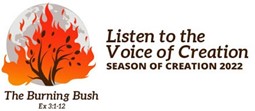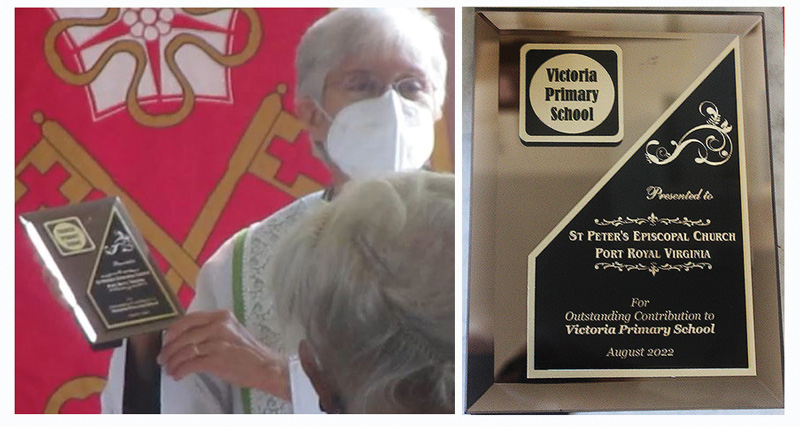For centuries, our theology our theology has focused on relationship with God and our human relationships with one another. The Season of Creation focuses God’s relationship with all creation and with our relationship with creation (and with God through creation). It highlights our role in understanding and addressing address the ecological problems we face today as a part of God’s creation.

“Imagine a great circle. God encircles everything else in this circle.
Inside the circle is a second circle, and that circle is us. We human beings encircle the rest of creation, at the center of the circle. Look at the word, earth. If you move the letter “h” from the back of this word to the front, the word “earth” becomes the word “heart.”
We are going to look at 6 keys to the Season of Creation
1 God as Creator The Spirit of God moving over the face of the water created the earth. Creation is also on a journey, it is ongoing constantly in a process of being made new.
The Bible speaks of a God who is not passive or distant, but active and involved. God here exercises divine power through peaceful means. God creates by the word “In the beginning, God designed a home, a home in which God dwells, a home in which God delights, a home which God calls good. The earth is God’s home…”Nothing goes to waste in this creation. All this creation has a purpose, and every bit of this creation depends on every other bit of creation.”
I his letter to the Romans, right up front, Paul makes this statement.”Ever since the creation of the world, God’s eternal power and divine nature, invisible though they are, have been understood and seen through the things that God has made.
The goal in worship then is to deepen our understanding of God as Creator, to celebrate God’s role as Creator, and to examine and deepen and widen our own relationships with God, creation, and with one another. How are we impacting creation which God said was “good.”
2 Jesus brings us Abundant Life –The Word Jesus was always with God even before creation began.
Jesus is the source of truth and understanding of God’s will. All of creation, including planet Earth, is the result of the impulse of the Word (Christ) from God. The Word is the supreme creative force through Whom all things were made. Jesus is the source of life by which men have a relationship with God and hope of eternal life. Christ reconciles all things in heaven and Earth
The Word is also divine wisdom, the principle of reason that gives order to the universe. Jesus dwelling in nature as one of us to bring us abundant life
As one of the Collects says “Things which were cast down are being raised up, and things which had grown old are being made new, and all things are being brought to their perfection by him through whom all things were made, Jesus Christ our Lord.”
Take a walk through the woods and you’ll see fallen trees and decay, and yet new birth is everywhere with seeds and new life Volcanoes give birth to lava. When the lava cools into rock, lichens grow on this rock, helping to erode it into soil in which plants can take root.
3. Role of the spirit. As the “Giver of life” and the “Sustainer of life,” the Holy Spirit is the source of our empowerment, inspiration, and guidance as we seek to live in a way sustainable for all God’s creation. Being “in the unity of the Holy Spirit” encompasses our relationship with all of life. This is foundational for our worship.
4 Humans have a role in Creation Care as caretakers and to be healers because we were created with the rest of nature . The breath of life is the created spirit that God gives all living creatures so they can live. In Genesis 2:7, it says that God “breathed into [Adam’s] nostrils the breath of life; and man became a living soul
We came from Earth and we cannot survive without all that Earth provides. Just as Earth has creative powers, so Earth itself has restorative powers. Unless we have centered opportunities to express awareness of and gratitude for our dependence upon Earth and our relationship with other creatures, we will not be whole as human beings.
Dr. William P. Brown of Columbia Theological seminary has written “The fundamental mandate for creation care comes from Genesis 2:15, where God places Adam in the garden to “till it and keep it…” Human “dominion” as intended in Genesis is best practiced in care for creation, The root of the word “dominion” is the Latin word “domus,” the word for home. To have dominion over the earth is to be a housekeeper of the home of all creation. Our task, as the people of the earth, is to encourage the earth’s fruitfulness rather than to strip it of every life-giving resource. The world is a gift and we need to nurture it as such to make is prosper
5. What must we do ? Open our eyes to the beauty of creation and see life is connected
In his letter to the Romans, right up front, Paul makes this statement. “Ever since the creation of the world, God’s eternal power and divine nature, invisible though they are, have been understood and seen through the things that God has made.”
This healing and care cannot even begin until we take the time to open our eyes and truly see what is around us; to know that even in the midst of the degraded condition of the earth, glimpses of the goodness that God had in mind at creation are still visible.
When we truly look at our home in creation, the original goodness and perfection of God’s plan for all of creation and for all of us gets revealed to us, and in that perfection, we can see the promise of the kingdom of God that will someday come to earth.
We tend to get lost in the big picture as we miss the details.
That’s why we must first, before we do anything else, take the time to appreciate the natural world in its beauty and sometimes terrible magnificence, to see it as the dwelling God has given us rather than an object to be used up for our own benefit. As the Pope has said many times, “We are the guardians of Creation” and “everything is connected.” We must be the stewards of our earth and be on guard for its exploitation.
We were created with the rest of nature. We came from Earth and we cannot survive without all that Earth provides. Just as Earth has creative powers, so Earth itself has restorative powers. Unless we have centered opportunities to express awareness of and gratitude for our dependence upon Earth and our relationship with other creatures, we will not be whole as human beings.<
So Jesus says, don’t just walk past a lily in the field. Stop and consider it.
To dwell on the beauty of a flower is to peer into the perfection of God’s creation. And to dwell on the beauty of creation can be a hopeful act, one that sustains people in the face of the most unimaginable disasters.
This act of seeing is a prayerful activity.
This act of prayerful seeing gives us hope and gives us an undying longing for the kingdom of God to come on earth, which is why Jesus taught us to pray, that God’s kingdom come, thy will be done, on earth, as it is in heaven. In God’s kingdom on earth all of creation will be restored.
6. Season of Creation emphasizes the creative role of humans. We must act to heal and restore our creation that was a gift to us. – Our baptisms in living water help us claim our place in God’s harmonious creation. When that baptismal water pours over our heads, we are given the opportunity to open our eyes to God’s creating powers throughout our lives. We have the desire to seek that new creation even when all around us has grown old and hope seems to have vanished.
The world is filled with creativity because it was created by a creative God whose art and talent are inexhaustible. In recent years, much of humanity has viewed creation as a resource to be exploited rather than a mystery to be celebrated and sustained. The time has come not only to celebrate creation but to transform our human relationship to creation by worshiping in solidarity with creation
Through the Season of Creation and worship we have an opportunity to come to terms with the current ecological crises in a spiritual way so as to empathize with a groaning creation. Worship provides a viable and meaningful way not only to include creation’s praise of God but also to engender a deep relationship with the suffering of a groaning creation.
“Imagine a great circle. God encircles everything else in this circle.
Inside the circle is a second circle, and that circle is us. We human beings encircle the rest of creation, at the center of the circle. Look at the word, earth. If you move the letter “h” from the back of this word to the front, the word “earth” becomes the word “heart.”
The current ecological crisis affects most of 6 days of creation – 2nd Day the sky , 3rd day – dry land, seas, plants and trees were created, 5th days creatures that live in the sea and creatures that fly were created 6th day animals that live on the land and finally humans
There are 4 areas of the environmental crisis.
- burning of fossil fuels (oil, coal, and natural gas are adding more greenhouse gases to the atmosphere that will cause temperatures to exceed 1.5C, most simulations suggest.
- Rising temperatures causes rise of sea levels though warming of water and melting of glacier
- Severe water shortages can be expected when there will be no or only very little ice left to melt in the summer. This will affect food supplies
- the global benefits provided by trees are being threatened by deforestation and forest degradation Deforestation is a major cause of global warming. When trees are burned, their stored carbon is released back into the atmosphere. The most important factors are clearance for agriculture (including cattle ranching), poor governance (illegal logging, corruption, and ineffective law and order), insecurity of land tenure, the system of international trade, poor planning (e.g. building of major trunk roads in forest areas), and unsustainable logging
- We long for the new creation when all is made whole, complete, contained, safe. All of us, no matter how our lives have gone, came from the life giving safety of our mother’s wombs. And somewhere deep down inside, it is to that safety and security that we all long to return.
Scripture describes this womb-like environment for humanity as the Garden of Eden, where all of creation lives together in harmony.
This is our season of waiting.
In birth and death, springtime and harvest, weeping and laughing, mourning and dancing, we are waiting on God.
And while we wait, we undertake our journeys within this world, hoping for the day when we will reach that place that the generations before us have reached—the presence of God, our Garden of Eden.
But as we journey, we must remember and rejoice in the fact that God has granted us the miraculous privilege of a sojourn in the midst of God’s intricate, magnificent creation.
God, who is constantly breathing and speaking new life into all of creation, will renew our strength and give us wings like eagles for our journeys to God, who is our beginning and our ending and our beginning again.
For everything there is a season.
So may we rejoice as the seasons turn, one to another, and as the days that seem long turn into the years that fly by.
But when we lost our way, so did the rest of creation.
But although we have lost our way, we have never lost our longing, and neither has creation.
And in that longing for the new creation lies our hope, and the hope of the whole creation
Jesus himself connects us with one another when we find him present in our midst as we break the bread and pour the wine and share it together, connected around God’s table, so that we can then go share God’s love with the world, working to reconnect what has been lost and disconnected.
And when we come together in God’s name to reconnect with creation itself, the creation that God calls good, the creation that God dwells within, the whole creation that God will gather in at the end, the insects, the birds, the creatures, the trees, the oceans and rivers and the earth itself,
God will rejoice as we work to reconnect all that we have broken and divided.
And we will find joy and rejoice ever more deeply and fully as God reconnects all of us in the fullness of time into God’s new creation– as it was in the beginning, and is now and ever will be, God’s world without end.





